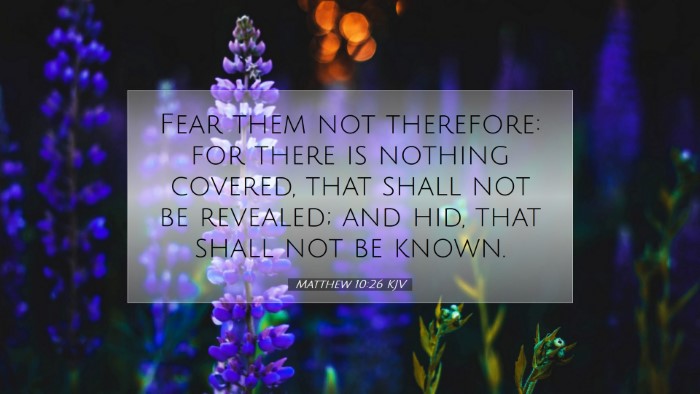Commentary on Matthew 10:26
In Matthew 10:26, Jesus provides a profound exhortation to His disciples regarding the nature of truth and the inevitable exposure of falsehood. The verse states, "Therefore, do not fear them, for there is nothing covered that will not be revealed, and hidden that will not be known."
Context of the Verse
This statement comes during Jesus’ instructions to His twelve disciples as He prepares them for their mission. Amidst the challenges they will face, including persecution and misunderstanding, He emphasizes the importance of fearlessness in proclaiming the truth. The larger context encompasses the apostles' authority to heal and proclaim the coming of the Kingdom, juxtaposed with the reality of resistance from the world.
Insights from Commentaries
Matthew Henry's Commentary
Henry highlights that the phrase “do not fear them” is a firm reassurance against the threats that the disciples might encounter. He suggests that true courage comes from the recognition of God's ultimate sovereignty over hidden truths. Henry asserts that all deceit and falsehood will inevitably be brought to light, emphasizing the futility of hiding anything from God’s scrutiny. He encourages believers to speak boldly, trusting that God’s truth will not remain concealed forever.
Albert Barnes' Notes
Barnes comments on the significance of the phrase “nothing covered that will not be revealed.” He notes that this serves as a reminder of divine justice. His analysis points to the certainty that God will disclose all that is concealed, both in terms of the truth of the Gospel and the hidden sins of individuals. He encourages believers to maintain their confidence in the truth even when faced with opposition, asserting that all hidden things, both good and evil, will ultimately be made known in God’s perfect timing.
Adam Clarke's Commentary
Clarke delves into the implications of “what is spoken in darkness shall be heard in the light.” He interprets this as a call to transparency and integrity within the Christian life. Clarke argues that the whispered criticisms and the clandestine plots against the disciples will ultimately fail because God's truth will shine forth. He emphasizes the notion that the secret motives of men will be unveiled, inviting believers to live in righteousness and proclaim God’s word openly, as nothing can remain hidden from God forever.
Theological Implications
The declaration in Matthew 10:26 bears significant theological implications regarding the nature of God as the ultimate judge and revealer of truth. It encourages believers to embrace a bold witness for Christ, grounded in the assurance that God is aware of all actions and intentions. The precept of fearlessness stems from the assurance that God will vindicate His people and reveal all things according to His divine wisdom.
Additionally, this verse provides a moral framework. It calls believers to live authentically in accordance with the Gospel, promoting a life characterized by truthfulness. The forthcoming revelation of every hidden thing points to the ethical responsibility of Christians to embody the teachings of Christ, knowing that their lives will ultimately be transparent before God.
Application for Pastors and Theologians
For pastors and theologians, Matthew 10:26 serves as a significant text for both teaching and counseling. In a world rife with misinformation and fear of backlash, the call to proclaim the Gospel without fear rests heavily on the ecclesiastical mandate to embody the truth of Christ.
Encouragement for Lived Truth
This passage challenges church leaders to foster an environment where truthfulness prevails. Encouraging congregants to confront their fears and speak out for Christ can lead to a more vibrant faith community. The promise that hidden truths will be revealed can impart a sense of eternity to their concerns and motivate honest conversations about faith, doubt, and community challenges.
Reassurance in Teaching
Moreover, this verse reassures those in ministry that their teaching, though it may face opposition, carries profound significance. Their role as disseminators of God's truth ultimately plays into the grand narrative of redemption, wherein all things will be reconciled unto Christ. This understanding can serve as encouragement for endurance in the face of challenges and a call to engage deeply with the Scriptures.
Conclusion
Matthew 10:26 is a powerful reminder of the values of fearlessness, truth, and divine justice in the life of a believer. The insights drawn from the commentaries of Matthew Henry, Albert Barnes, and Adam Clarke provide rich layers for understanding this verse. It encourages a faithful testimony amid challenges, fostering the courage to declare God’s truth in a world where hidden agendas and motives often thrive. Such teachings remain vital for pastors, students, and theologians as they navigate the complexities of faith in the modern world.


